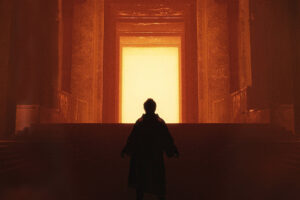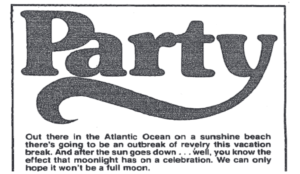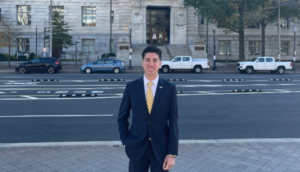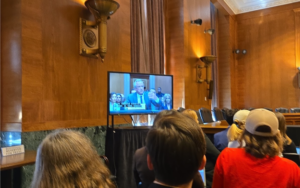CUA Alumnus Father Ambrose Little Celebrates the Feast of St. Thomas Aquinas Mass
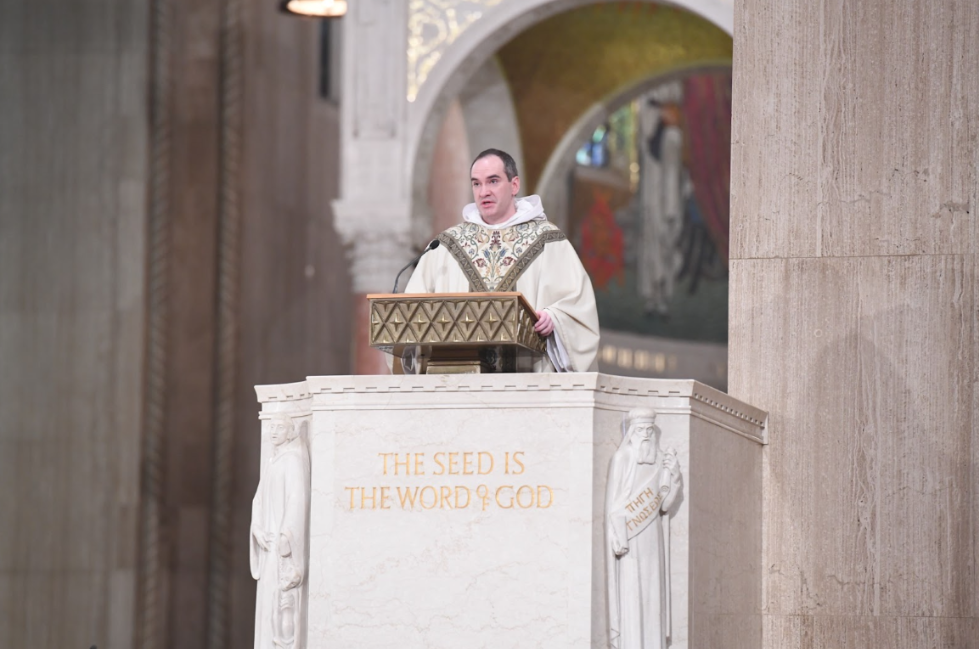
Image Courtesy of Pat Ryan
By Zachary Lichter
The CUA community and the Dominican House of Studies came together on January 28 to celebrate the Mass for the Feast of St. Thomas Aquinas, the University’s patron, in the Basilica of the National Shrine of the Immaculate Conception. Mass began at 12:10 p.m., and classes were canceled between 11:50 p.m. and 3:00 p.m. so students, faculty, and staff could attend. The Mass was also broadcasted on the Eternal Word Television Network for those unable to attend in-person.
St. Thomas Aquinas is the patron saint of education. He was an Italian philosopher, theologian, and Dominican friar and is most known for writing the Summa Theologia, a book on theological and philosophical thought. What made the date of this Mass special was its proximity to both the saint’s actual feast day as well as his 800th birthday.
Ryan Corey, a junior philosophy major, commented on why students should attend.
“It is important to go to this Mass in celebration of our University’s patron,” Corey said. “This is also a great communal event for the students to come together to celebrate a man, Thomas Aquinas, who is now a Saint of the Church.”
Father Ambrose Little was the main celebrant and homilist. He is a Dominican friar from the Dominican Province of St. Joseph, an Assistant Professor of the Pontifical Faculty of the Immaculate Conception at the Dominican House of Studies, an Assistant Director of the Thomistic Institute, and an ‘07 CUA Alumnus. He was assisted by Deacon Basil Burroughs and Deacon Linus Martz, two transitional deacons from the Dominican Province of St. Joseph. Among the concelebrants were Monsignor Ronny Jenkins, the Dean of Canon Law; Father Gladstone “Bud” Stevens, Rector of the Theological College; Father Dominic Langevin, Vice President and Academic Dean of the Pontifical Faculty of the Immaculate Conception at the Dominican House of Studies; Father Carter Griffin, Rector of the St. John Paul II Seminary; and Father Allen Moran, the Prior Provincial of the Dominican Province of St. Joseph.
Dr. Steven Cheeseman, the President and CEO of the National Catholic Education Association, read the Epistle Reading from the Book of Wisdom (Ws. 7: 7-10, 15-16). The Responsorial Psalm (Ps. 37:3-4, 5-6, 30-31) was sung by the Catholic University of America’s Schola Cantorum. Deacon Basil read the Gospel reading from the Gospel of Matthew (Mt. 5:13-19).
Father Ambrose began his homily by telling the story of St. Thomas Aquinas’ vision of the Lord in 1273, which caused him to stop writing and get rid of his writing material. Before he died, his scribe Reginald of Piperno asked why he stopped writing, and St. Thomas Aquinas said, “I cannot do this anymore. Everything I’ve written seems to me as straw or chaff in comparison to what I’ve seen.”
Father Ambrose asked everyone why people do all of this work only to produce chaff. He then asked why Thomists—people who study St. Thomas Aquinas—spend their lives picking the brain of St. Thomas Aquinas, who finds his own work to be mere chafe rather than the infinite Glory of God.
St. Thomas Aquinas answers these questions by saying that people first need faith, most particularly, theology. Father Ambrose continued to ask why people should still study St. Thomas Aquinas. Father Ambrose said that the world needs teachers, and God has called people to teach. People come to St. Thomas Aquinas as their teacher because he is immersed by the Word of God, and while he sees his work as worthless, it still motivates people to study him.
Nicholas Michalczyk, a senior physics major, commented on what he loved about the Mass.
“Father’s homily today was very insightful because even though St. Thomas came to regard his writings as mere chaff, we can still benefit from studying them, because by opening our minds to wisdom and truth, we can come to know God,” Michalczyk said. “Every year, I love attending the Mass of St. Thomas Aquinas because we retell the story of this great scholar. The University does well to remind us that our studies ought to be impacted by our spiritual lives.“

